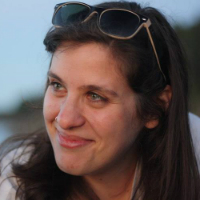You could imagine the look on people’s faces when a group of rabbis, donned in kippot and talitot, walked into their Publix Supermarket in Florida this past December. On a delegation to support the Coalition of Immokalee Workers (CIW) in their fight for dignity and human rights for Florida tomato farmers, we went to the grocery store to remind the corporation and its consumers of the human beings behind their tomatoes and the rights that they deserve. Walking determinedly towards the tomatoes and holding fliers in our hands, we formed a semicircle in front of them and sang “Ozi v’Zimrat Yah” while Lupe, a CIW leader, spoke about the Fair Food Program.
As soon as we began to sing and Lupe began to speak, shoppers began to stop what they were doing. Some looked at us askance, some with curiosity, and others looking taken aback, but then they began to gather around us. A number of us went to talk to them, handing them fliers about the CIW and talking to them about the CIW’s push to get Publix to sign onto the Fair Food Program, which ensures that the grocery chain would buy tomatoes from farms that treat their workers with dignity. After the few minutes of this, the store manager came over to us and we handed him a letter urging Publix to sign onto the Fair Food Program.
This was a moment of disruption and discomfort for customers and staff: we pushed them to reckon with the fact that their grocery store is not supporting humane wages and working conditions for those who pick the fruit they serve their families. And it was only because of our disruption that we were able to begin shifting their hearts and minds. The value of this kind of disruption for the sake of justice is one the lessons of Parashat Ki Tisa. In this parashah, Moshe goes up Mount Sinai to receive the two tablets of the Ten Commandments, and when he doesn’t come down when the people expect, they build a Golden Calf to worship. In making this idol, they have turned so completely away from G-d that they now tell themselves an entirely different story about how they got out of Egypt: about the Golden Calf they say, “These are your gods, O Israel, who brought you up from the land of Egypt!” (Exodus 32:4). A few verses later, G-d tells Moshe about this, and tells him to return to his people. And when he descends, he is furious at their worship and dancing and hurls the tablets out of his hands, and they shatter at the foot of the mountain (Exodus 32:19).
Moshe did not break the tablets spontaneously in a moment of hot anger; he was much too strategic of a leader to do that. Instead, he shattered them at the right moment to create productive discomfort. According to the Netziv in Ha’amek Davar: “The text describes the greatness of Moshe, how he took the calf and burned it and no man resisted him…This was because Moshe, with deep psychological insight, had not broken the Tablets on the mount, but resolved to bide his time in order to do it when it would make the greatest impact on them, shocking them and grieving them to such an extent, that they would not have the heart to resist his harsh corrective measures.” What Moshe realized was that such a deep turning away from G-d required a significant jolt to alert them to their wrongdoing and bring them back to G-d. Even though people dislike public disruption, it tends to shift their thinking and action on the issues that demand their attention. Sometimes we aren’t able to notice the water we swim in, and we need to be made uncomfortable if we’re going to do something about the injustices plaguing our communities.
In their commitment to live justly, the People of Israel kept the broken shards of the tablets with them as they marched towards ultimate liberation. We too hold these shards as we continue to pursue justice in our time, and I want to invite you to take action with us. From March 2-12, farmworkers and thousands of consumer allies will be marching and mobilizing to bring Wendy’s into the Fair Food Program with actions in New York City, Columbus, OH, and Palm Beach, FL. T’ruah will be organizing the Jewish community’s presence and we want you to be there, or to organize your own local solidarity action. Sign up now to be part of this effort.
Mimi Micner is a 2nd year rabbinical student at Hebrew College in Newton Centre, MA, and an alumna of T’ruah’s Summer Fellowship in Human Rights Leadership. She is an activist, high school Jewish educator, and community organizing trainer.

